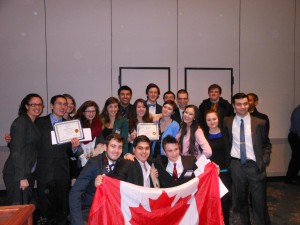Just like any MUN story, this one starts with meeting an incredible group of intelligent, hilarious and talented individuals. The difference, though, is that they are not university students. They’re at Dawson College, a CEGEP, the two years between grade 11 and university in Quebec, one province in Canada, making them younger than the average delegate.
As an alumni and cofounder of the program, I’ve remained on as coach over the past two years, helping new delegates in the CEGEP system develop their skills and compete. A few weeks ago, though, marked a milestone. Dawson College won Best Large Delegation at PUNC, Penn State’s all crisis conference. This was the first time Dawson has ever won a delegation award on the university circuit.
Being a delegate in CEGEP is a very different experience than doing MUN through a university.
First of all, you’re often not being educated in the fields that tend to favor Model UN. There’s a lot of talk about Model UN being all International Relations and Economics majors, but you don’t even get a formal major in CEGEP.
Obviously, there’s also the age difference. Being younger means having been exposed to less relevant information and having less real world experience.
As well, there’s a high turnover rate in CEGEP MUN programs, because CEGEP is only a two year program for most students. That means as soon as a delegate has really begun to hone their skills, they’re moving out of the program. This doesn’t leave a lot of room for CEGEP programs to retain well-trained executive structures or build a seriously attached team.
Another CEGEP in Montreal, Marianopolis College, attends WorldMUN every year and is well-known around Montreal for having a very comprehensive MUN program as well.
As you can see, it’s not easy being in a CEGEP MUN program. That’s what makes what Dawson accomplished so remarkable. Winning a delegation award, and 9 individual awards, requires consistency and preparation.
As tough as the CEGEP program can be, it does have its benefits. It is a perfect training ground for future university delegates. At a younger age, students get to train and compete at the university level before ever entering the university system. This can give them a significant advantage in making the team at whatever university they choose to attend, since they already have the requisite experience.
At McGill, lots of CEGEP graduates sit on McGill conference secretariats and win at university conferences.
The Model UN scene has always been aware of the CEGEP system, but Dawson’s experience at PUNC proves that they can be a force of their own, and a strong training ground for delegates of the future.



